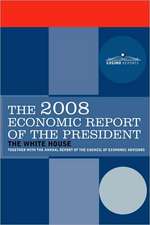Setting Sail into the Age of Digital Local Government: Trends and Best Practices: Public Administration and Information Technology, cartea 21
Autor Tony E. Wohlers, Lynne Louise Bernieren Limba Engleză Hardback – 12 dec 2015
| Toate formatele și edițiile | Preț | Express |
|---|---|---|
| Paperback (1) | 378.92 lei 6-8 săpt. | |
| Springer Us – 27 mar 2019 | 378.92 lei 6-8 săpt. | |
| Hardback (1) | 386.22 lei 6-8 săpt. | |
| Springer Us – 12 dec 2015 | 386.22 lei 6-8 săpt. |
Din seria Public Administration and Information Technology
- 20%
 Preț: 689.22 lei
Preț: 689.22 lei - 18%
 Preț: 944.19 lei
Preț: 944.19 lei - 18%
 Preț: 1121.13 lei
Preț: 1121.13 lei - 15%
 Preț: 652.64 lei
Preț: 652.64 lei - 18%
 Preț: 1010.03 lei
Preț: 1010.03 lei - 15%
 Preț: 649.06 lei
Preț: 649.06 lei - 15%
 Preț: 638.57 lei
Preț: 638.57 lei - 20%
 Preț: 336.35 lei
Preț: 336.35 lei - 15%
 Preț: 650.04 lei
Preț: 650.04 lei - 15%
 Preț: 639.08 lei
Preț: 639.08 lei - 20%
 Preț: 562.86 lei
Preț: 562.86 lei - 18%
 Preț: 787.91 lei
Preț: 787.91 lei - 18%
 Preț: 783.20 lei
Preț: 783.20 lei - 18%
 Preț: 791.57 lei
Preț: 791.57 lei - 18%
 Preț: 958.07 lei
Preț: 958.07 lei - 15%
 Preț: 643.00 lei
Preț: 643.00 lei - 18%
 Preț: 1230.35 lei
Preț: 1230.35 lei - 18%
 Preț: 894.16 lei
Preț: 894.16 lei - 18%
 Preț: 784.13 lei
Preț: 784.13 lei - 15%
 Preț: 648.24 lei
Preț: 648.24 lei - 18%
 Preț: 778.45 lei
Preț: 778.45 lei - 18%
 Preț: 891.33 lei
Preț: 891.33 lei - 18%
 Preț: 1009.22 lei
Preț: 1009.22 lei - 18%
 Preț: 722.40 lei
Preț: 722.40 lei - 18%
 Preț: 893.05 lei
Preț: 893.05 lei - 15%
 Preț: 646.62 lei
Preț: 646.62 lei - 18%
 Preț: 888.01 lei
Preț: 888.01 lei - 24%
 Preț: 754.47 lei
Preț: 754.47 lei - 18%
 Preț: 789.03 lei
Preț: 789.03 lei - 15%
 Preț: 637.59 lei
Preț: 637.59 lei - 15%
 Preț: 642.51 lei
Preț: 642.51 lei - 24%
 Preț: 699.29 lei
Preț: 699.29 lei
Preț: 386.22 lei
Nou
Puncte Express: 579
Preț estimativ în valută:
73.91€ • 80.26$ • 62.09£
73.91€ • 80.26$ • 62.09£
Carte tipărită la comandă
Livrare economică 23 aprilie-07 mai
Preluare comenzi: 021 569.72.76
Specificații
ISBN-13: 9781489976635
ISBN-10: 1489976639
Pagini: 123
Ilustrații: XI, 123 p. 16 illus., 13 illus. in color.
Dimensiuni: 155 x 235 x 10 mm
Greutate: 0.37 kg
Ediția:1st ed. 2016
Editura: Springer Us
Colecția Springer
Seria Public Administration and Information Technology
Locul publicării:New York, NY, United States
ISBN-10: 1489976639
Pagini: 123
Ilustrații: XI, 123 p. 16 illus., 13 illus. in color.
Dimensiuni: 155 x 235 x 10 mm
Greutate: 0.37 kg
Ediția:1st ed. 2016
Editura: Springer Us
Colecția Springer
Seria Public Administration and Information Technology
Locul publicării:New York, NY, United States
Public țintă
ResearchCuprins
Part I: Information Communication Technologies in the World of Politics.-Chapter 1. Current Trends in Information CommunicationTechnologies.- Chapter 2. The Normative Framework: Information CommunicationTechnologies, Local Government, and Democratic Theory within the Context ofPublic Administration.- Chapter 3. The Analytical Framework to UnderstandDigital Government at the Local Level.- Part II. Comparative Analysis ofDevelopments in Local E-Government and E-Democracy.- Chapter 4. United States.-Chapter 5. France.- Chapter 6. Germany.- Chapter 7. Japan.- Part III. Conclusion.-Chapter 8. Comparative Trends and Best Practices: What is the Port of NextCall?.
Notă biografică
Dr. Tony E. Wohlers, Department of History and Government, Cameron University, Ph.D. Political Science, Northern Illinois University. 2004. Specialization in Public Policy, Public Administration, Comparative Politics, European Politics, Research Methods, Local Electronic Government, and BiopoliticsDr. Lynne L. Bernier, Associate Professor Politics, Carroll University, Waukesha, Wisconsin. Recieved from Ph.D. University of Wisconsin-Milwaukee, political science. Areas of Specialization: Comparative local/metropolitan government, intergovernmental relations, global political economy
Textul de pe ultima copertă
The Internet and related technologies havedramatically changed the way we live, work, socialize, and even topple nationalgovernments. As the Internet becomes increasingly pervasive across societies,we find more often that governments adopt Information CommunicationTechnologies (ICTs) as part of their toolbox for facilitating efficient andcitizen-oriented service delivery at all levels of government. Local governmentsacross the major industrialized democracies have not been an exception to thistrend and have set sail into the age of digital government. Closest to theircitizens, towns and cities have adopted ICTs to facilitate electronicgovernment (e-government). While research on local e-government functionalityin terms of information dissemination, service delivery, and citizen engagementcontinues at an impressive empirical and methodological pace, gaps in ourknowledge remain. Cross-national comparative research on local e-governmentthat covers a wide range of municipalities in combination with in-depth casestudy analyses is lacking. Informed by a comparative case study approach, thisbook seeks to narrow that gap and offer practical policy solutions tofacilitate local e-government. We do so by pursuing both a macro and microperspective of e-government functionality in the federal republics of Germanyand the United States and unitary France and Japan. The macro perspectivefocuses on the state and scope of e-government functionalityacross a large number of randomly selected municipalities of all sizes in theseadvanced industrialized countries. Based on a small sample of case studies, themicro perspective analyzes the successful implementation of e-government inSeattle (United States), Nuremberg (Germany), Bordeaux (France), and Shizuoka City(Japan).
Caracteristici
Systematically analyses the advances made and implications of ICTs for electronic government (e-government) and electronic democracy Investigates ICTs increasingly influential role in shaping social relationships, political power, democratic government, and the public-services sector across the globe Puts into context the use of new information technology within public administration in the advanced industrialized democracies?

















